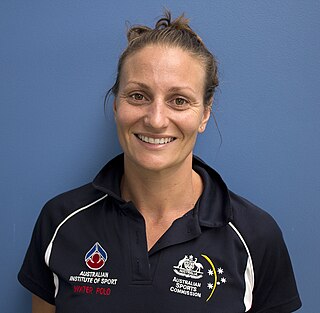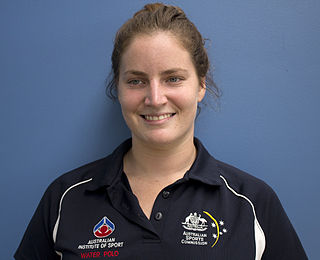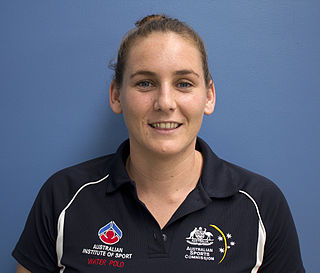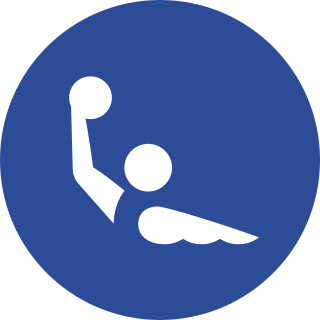
The water polo competition at the 2000 Summer Olympics in Sydney, Australia saw Hungary’s return to the gold medal platform and the introduction of the women’s tournament. The Australian women had lobbied the IOC hard for the inclusion of women’s water polo in the Olympics, including showing up at the airport dressed only in their swimsuits during one pre-Olympic visit by members of the IOC.

Australia, the previous host of the 2000 Olympics at Sydney, competed at the 2004 Summer Olympics in Athens, Greece from 13 to 29 August 2004. Australian athletes have competed in every Summer Olympic Games of the modern era. The Australian Olympic Committee sent a total of 470 athletes to the Games to compete in 29 sports.

Water polo has been part of the Summer Olympics program since the second games, in 1900. A women's water polo tournament was introduced for the 2000 Summer Olympics. Hungary has been the most successful country in men's tournament, while the United States is the only team to win multiple times at the women's tournament since its introduction. Italy was the first to win both the men's and women's water polo tournaments.

The Australia national women's water polo team represents Australia in women's international water polo competitions and is controlled by Water Polo Australia. It was one of the most successful women's water polo teams in the world. It is currently organised into the Asia/Oceania regional group.

The women's water polo tournament at the 2004 Summer Olympics was contested between August 16 and August 26 at the Olympic Aquatic Centre in the Athens Olympic Sports Complex. Eight teams qualified for the Games, with Italy defeating the host nation Greece for the gold medal. The United States won the bronze medal.

The Australia women's national soccer team is overseen by the governing body for soccer in Australia, Football Australia, which is currently a member of the Asian Football Confederation (AFC) and the regional ASEAN Football Federation (AFF) since leaving the Oceania Football Confederation (OFC) in 2006. The team's official nickname is "the Matildas" ; they were known as the "Female Socceroos" before 1995.

Zoe Arancini is an Australian water polo player who plays driver, counter-attacker, or outside shooter. She plays club water polo in the National Water Polo League for the Fremantle Marlins, where she has won the league championship in 2005, 2007 and 2008 and is coached by her mother. She has represented the country as a member of the Australia women's national water polo team on the junior and senior level, with over eighty appearances for national team between the two levels. She won a gold medal at the 2011 Canada Cup, silver medals at the 2010 FINA World League Super Finals and 2010 FINA World Cup, and bronze medals at the 2009 FINA World League Super Finals and 2011 FINA Junior World Championships. She represented Australia at the 2012 and 2016 Summer Olympics.

Melissa Alison Rippon is an Australian former water polo player. She played for the Brisbane Barracudas who compete in the National Water Polo League. She represented Australia in water polo at the 2004 Summer Olympics, 2008 Summer Olympics and at the 2012 Summer Olympics winning bronze medals at both of the latter two. She has earned a bronze medal at the 2010 FINA Women's Water Polo World Cup.

Ashleigh Southern is an Australian water polo player. She is a centre forward or outside shooter who has represented Australia on the junior and senior national teams. She won a gold medal at the 2009 Youth Olympic Festival, a silver medal at the 2010 FINA Women's Water Polo World Cup, a bronze medal at the 2011 FINE World League and a bronze medal at the 2011 FINA Junior World Championships. She plays club water polo for the Brisbane Barracudas, where she won a league championship in 2010. In 2014–15 season, she played for the Greek powerhouse Olympiacos where she won the LEN Euroleague, scoring 4 goals in the 10–9 win of Olympiacos against Sabadell in the final of the competition. She represented Australia at the 2012 and 2016 Olympics.

Kate Maree Gynther is an Australian former water polo player. She played for the Brisbane Barracudas in the National Water Polo League. She represented Australia as a member of the women's senior national team at the 2004 Summer Olympics, the 2008 Summer Olympics and the 2012 Summer Olympics, winning a bronze medal at the 2008 and 2012 Games. She is a leading goalscorer in Olympic water polo history, with 30 goals. She was the joint top sprinter at the 2012 Olympics with 21 sprints won; and a leading sprinter in Olympic water polo history, with 39 sprints won. She has also won a bronze medal at the 2005 Super League Finals.

Bronwen Knox is an Australian former water polo centre back/centre forward. She played for the National Water Polo League's Queensland Breakers before switching to the Victorian Tigers for the 2012 season. In 2013–14 season, she played for the Greek powerhouse Olympiacos in the European competitions, winning the LEN Trophy.

Nicola Maree Zagame, nicknamed Ziggy and Nicky, is an Australian water polo centre back/driver. She has represented her country as a member of Australia women's national water polo team on both the junior and senior levels, and was part of the silver winning team at the 2010 FINA Women's Water Polo World Cup. She represented Australia at the 2012 Summer Olympics and the 2016 Summer Olympics, winning a bronze medal at the 2012 Olympics.

Gemma Jane Beadsworth is an Australian water polo centre forward. She plays for the Fremantle Marlins in the National Water Polo League. She has represented Australia at three Olympic Games and won bronze medals at the 2008 and 2012 Summer Olympics. She has also won a silver medal at the 2007 World Championship, a gold medal at the 2006 World Cup and a silver medal at the 2010 World Cup.

The water polo tournaments at the 2020 Summer Olympics took place at the Tokyo Tatsumi International Swimming Center in Kōtō. Twenty-two teams competed in the tournament, an increase of two from the previous editions. Men's Water polo was also the last final played before the closing ceremony.
The women's water polo tournament at the 2017 World Aquatics Championships, organised by the FINA, was held in Budapest, Hungary from 16 to 28 July 2017.

The women's tournament of water polo at the 2020 Summer Olympics at Tokyo, Japan was played from 24 July to 7 August 2021 at the Tokyo Tatsumi International Swimming Center. It was the sixth appearance of the women's tournament, which had been held consecutively since 2000 and also was the first time on history that the tournament had 10 teams competing.
Eight teams competed in the women's football tournament at the 2000 Summer Olympics. In addition to the host nation, Australia, seven other teams qualified for the tournament based on the results from the 1999 FIFA Women's World Cup.












